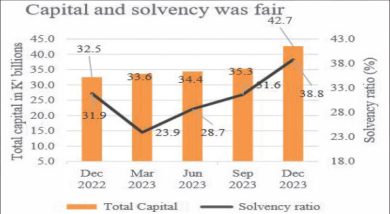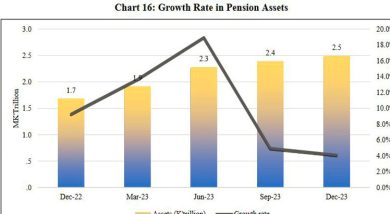Positive economic news boost Malawi Stock Exchange
- Market watchers cautiously optimistic
The Malawi Stock Exchange (MSE) is set for a strong performance on the back of a stabilising macroeconomic environment, local bourse watchers say.
But the analysts have coated the optimism with caution, saying the local stock market is still vulnerable to several shocks that could gnaw at recent gains.
The buoyant news over the past few months on major macroeconomic variables that have traditionally impacted on the local stock market—falling inflation, retreating treasury bill (TB) rates and a resilient kwacha—have positively filtered into the MSE.
In the first quarter of 2015, the bourse registered a positive return on index as reflected in the increase in the Malawi All Share Index (Masi) from 14 886.12 points registered in January to 15 364.50 points registered on March 31 2015.
That movement gives a return on index of 3.21 percent (11.53 percent in dollar terms) compared to 2.01 percent (7.79 percent in dollar terms) recorded over same period last year.
The market performance is also a signal that something positive is taking place in the economy, especially in terms of policy implementation.
According to NBM Capital Markets Limited assistant investment research analyst Paul Mojoo, the current economic status is a positive development to the stock market.
He singled out the drop in treasury bills rates—a sign of tight fiscal policy—as good for the market.
“When rates decrease [as is the case now], investors will now be shifting their money from money market to capital market where the investment is more futuristic.
“We have already seen the reduction of TBs from 27 percent to 24 percent. With such indicators, demand for shares is likely to grow in anticipation that companies will perform well and that investors will get better dividends; hence, pushing the price of shares upwards,” he says.
But some market analysts are cautious.
FDH Stockbrokers Limited manager Nelson Mkwende—while acknowledging that the current economic underpinnings are good for the MSE—said it will take time for potential investors to return to the market after fleeing economic underperformance in previous years.
“We are coming from a background where inflation rates, interest rates have been high and the kwacha itself has not been stable, making it hard for people to borrow from the banks.
“Less borrowing means less money that people use to spend on investment avenues and stock market expects people to invest residual income and if you do not have such cash, you forego such investments,” he says.
Economic statistician Alick Nyasulu also warns against reading too much into the current MSE surge, saying the local market rarely responds to economic trends.
“Gains in the kwacha or its depreciation, while expected to have an impact on the MSE, is most times the same. The same can be argued in terms of inflation, the market is too small and dominated by few institutional traders, especially pension funds,” he says.
Institutional investors usually hold on to their stocks, resulting in market liquidity being too low to move major indices.
Nyasulu says the fact that the Malawi Revenue Authority (MRA) is reporting low revenues means that government borrowing may jump, which could raise TB rates and make the money market more attractive than the capital market since the former have higher returns and are above inflation.
“Given that most MSE players are the same involved in treasury bills investments, we expect an even dormant MSE. The recent dividend declarations by MSE-listed companies have not generated much interest or moved activity.
“We should now start looking for solutions to make MSE more attractive to more listings. Maybe it is time MSE went private and authorities took the oversight role,” he says.
With inflation rate on the decline at 18 percent as at March 2015 compared to roughly 24 percent around the same time last year, Nico Asset Managers Limited research analyst Tafika Nyirenda says it is difficult to determine the overall impact of the general rise in prices on the stock market as a whole.
She says inflation is expected to continue declining as a result of the harvest season. However, it may go up again once the lean season begins.
The floods’ impact on crop production levels may also lead to food shortages, posing inflation risks that stock market investors may fear could diminish their returns.
“For companies that trade on the stock exchange, this may lead to lower profit margins, which may negatively impact the performance and share prices of some of the companies,” said Nyirenda.
The kwacha has in recent months held its own, winning back most of the value it lost during the September to December 2014 period when it shed more than 20 percent in free-fall depreciations.





